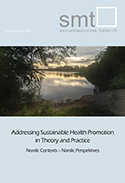Abstract
Health promotion has been a part of the policies, strategies and services of the Nordic welfare states since the beginning of the millennium. This article contributes to analyses of health promotion in political programs, institutions and practices in Denmark in later years, and holds a special interest in how inequality in health is addressed. In the Nordic countries, universalism has been a key tenet of welfare services, with great potential of guiding health promotion towards more equality in health. However, a neoliberal development over the last two decades has influenced the field of health and also the ideas, conceptions and strategies of health promotion. This article looks into how health promotion has taken form in Denmark, through conflicts of interest in health policies, and changes in central health promotion programs, that turn away from earlier universalistic and social political framing of health prevention and promotion. Health promotion in Denmark has been marked by years of conflicts and the interest in influencing the psychosocial environment of health to gain more equality in health has weakened. The analysis shows that central health promotion programs that direct local government practices, do not identify the characteristics of the psychosocial environments of health for various groups of citizens, but identify socially less privileged groups with potential health risks, and wishes to intervene into the social reproduction of unwanted health conduct. Health promotion plays an increasing role in the categorisation and discrimination of less privileged citizens on the background of their health conduct and social positions and situations. In institutional practices in child and family health promotion the article finds that inequality in health is not addressed as a professional problem, but is none the less present in the way citizens are deligitimised, categorised and marginalised. Health promotion institutions on this background distribute obligations and invite engagement of citizens in socially segregated ways. These categorising and discriminatory practices contribute to excluding and devaluating the problems of social inequality from health promotion in schools, kindergartens and health care institutions for children and parents.
Författare som medverkar i Socialmedicinsk tidskrift accepterar att deras verk publiceras under licensen Creative Commons Attribution-NonCommercial 3.0 Unported. Denna licens tillåter att en tredje person delar ut författarens arbete (kopierar, distribuerar och sänder verket) och skapar bearbetningar av det under förutsättning att: författaren/na och/eller licensgivaren anges på ett korrekt sätt, verket inte används i kommersiellt syfte samt om verket återanvänds eller distribueras måste information tydligt anges om upphovsrättsvillkoren som gäller för verket.
Författare behåller upphovsrätt för deras arbete men garanterar samtidigt publiceringsrättigheter för första publicering och all publicering via Internet till Socialmedicinsk tidskrift. Vidare kräver Socialmedicinsk tidskrift att författaren överför samtliga upphovsrättigheter för kommersiell användning av verket till utgivaren (Socialmedicinsk tidskrift). Inkomster från kommersiell försäljning används för att kunna fortsätta att publicera smt både i tryckt format och online utan publiceringsavgifter.
